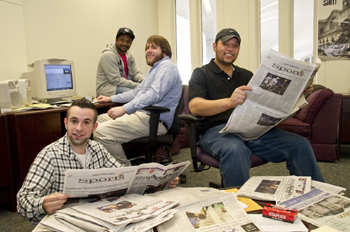Profiling the ASP: Behind the Bylines
 |
The majority of editors and writers at the Albany Student Press aspire to be journalists, including (from left to right) editors Irving DeJohn, Damore Ramwa, Jon Campbell and writer Joseph Chaparro. (Photo Mark Schmidt) |
Every Tuesday, the Albany Student Press (ASP) hits newsstands around campus. Sometimes, just as the stack arrives, students hands immediately reach out to pick up a copy. Some begin reading while walking the length of the lecture center hallways. Others tuck it inside their notebooks and tote it to class. It�s a moment, though fleeting, that the ASP managing editor Jon Campbell looks forward to each week.
�It�s kind of like, �Wow, someone actually reads this.� That�s cool,� said Campbell, a senior journalism major.
Since 1916, the ASP has been a weekly staple on the UAlbany campus, known for its quirky headlines, off-beat stories and routine features like �Crime Blotter� and �Podium Perspective.� But behind the bylines, there is a dedicated group of students logging 15-20 hours a week, working on deadline until 4 a.m., juggling courseloads, internships and regular college activities for one sole purpose: to provide the news.
�You want people to read you and enjoy reading you and have reporters get satisfaction out of what they�re writing,� said senior journalism major Irving DeJohn, arts & entertainment editor. �We work hard to put out a good product, something we can be proud of.�
For the dozen or so editorial board members who comprise the paper�s backbone, it�s often equated to working a part-time job. Campbell said they tell newcomers to think about the amount of work they think it will take, double it, and that�s the real amount.
It begins at Tuesday�s 9 p.m. editorial board meeting, where they discuss potential stories and writers for the next week�s edition. The rest of the week is devoted to interviewing, writing and editing. Over the weekend, editors work to lay out the paper for a Monday morning deadline. Once it hits campus newsstands the next day, the cycle starts all over again.
�People don�t realize what goes into it, managing all the writers, the content, the photos,� said DeJohn. �Basically it�s putting together a puzzle of a couple of pages every week.�
And that�s just the physical side. The ASP is a financially-independent paper, which means it receives no University or other funding and must seek advertising to stay afloat. It�s also a completely student-run venture, driving the need to consistently �re-load� its staff with new recruits.
To the ASP staff, though, it�s all worth the effort. In just her freshman year, assistant editor/writer Molly Eadie said she�s learned everything from layout to story development, expanding her classroom knowledge with real world experience. For senior Joseph Chaparro, the ASP has provided his first opportunities to interview people and report on events. For some students, their ASP experience has led to internships at major publications, including the New York Daily News and Gannett News Service. ASP alumni currently work at publications like The New York Times and Post Star.
"The ASP is an invaluable resource. It's where our apprentice journalists go to cut their teeth. I wish the paper well in its next hundred years on the job," said Thomas Bass, Professor of English and Journalism.
For current students, the ASP has also further enhanced their career aspirations to become journalists.
"One of our goals is to be a news source. But our other goal is to develop the talent of all the people involved in the paper," said editor-in-chief Ted Bean, who is pursuing a Master's in Business Administration at UAlbany. �It�s getting our writers their first clips to help them get internships, getting our photographers published so they can show their work, and especially with our editors, giving them a chance to develop their editing and reporting skills, as well as their people skills to deal with different writers.�
More recently, the ASP has branched out from its traditional newspaper with a blog on the Times Union Web site, accounts on Twitter and Facebook and a relaunch of its Web site � all in an effort to keep evolving, expanding, and most importantly, keeping students interested.
�It�s the student paper, literally. Without the students writing and reading, the ASP would be nothing,� said DeJohn.
![]() For more news, subscribe to UAlbany's RSS headline feeds
For more news, subscribe to UAlbany's RSS headline feeds


